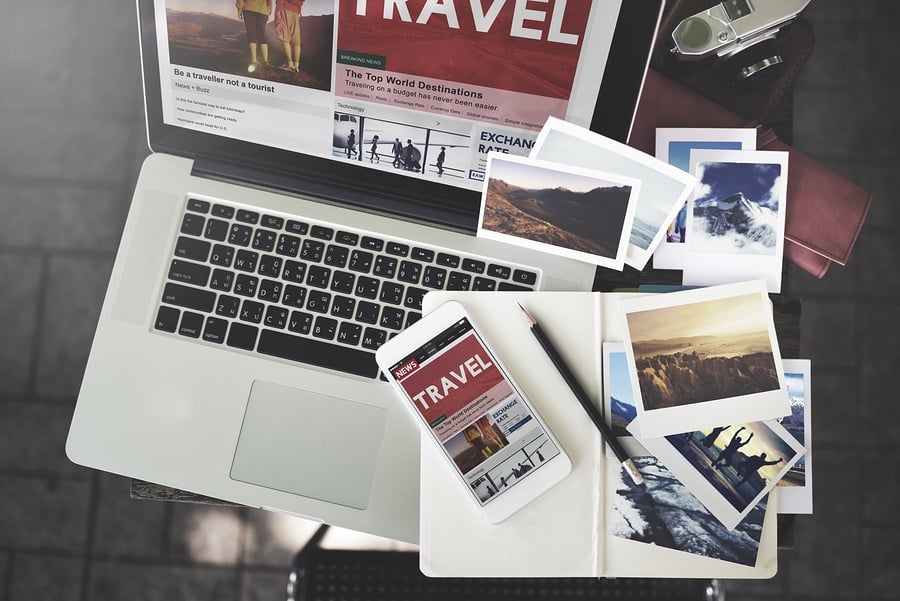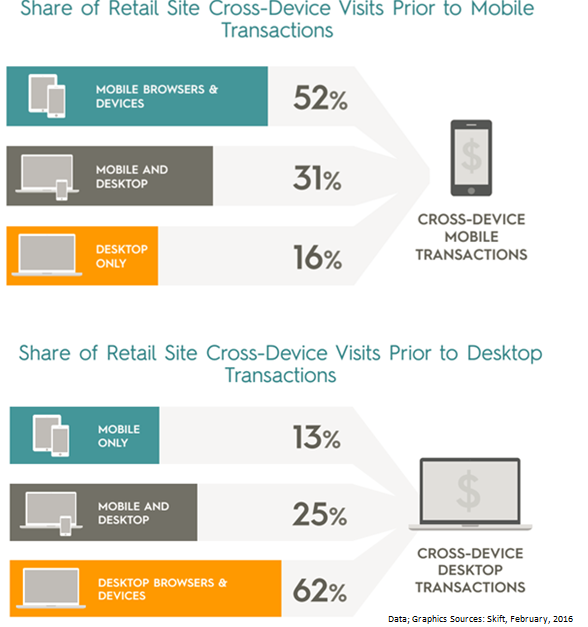5 Important Travel Industry Trends of 2016
By Nick Ostdick on Dec 29, 2016 10:30:39 AM

As 2016 comes to a close, it’s important for travel agencies, travel management, tour operators, and  mother major players in today’s travel industry to stop and reflect on the past 12 months in order to get a better understanding of what the coming year might have in store. With everything from technology to shifting demographics to new and emerging markets, 2016 was an influential year for the travel industry driven in large part by travel companies reimagining how they function on a daily basis - and that’s not to mention a host of global, political, and environmental events, each of which presented challenges and opportunities for travel companies worldwide.
mother major players in today’s travel industry to stop and reflect on the past 12 months in order to get a better understanding of what the coming year might have in store. With everything from technology to shifting demographics to new and emerging markets, 2016 was an influential year for the travel industry driven in large part by travel companies reimagining how they function on a daily basis - and that’s not to mention a host of global, political, and environmental events, each of which presented challenges and opportunities for travel companies worldwide.
Given how busy of a year 2016 was, it can be difficult for those within the travel industry to pause and take stock of the important stories, developments, and trends that fueled both the travel company and traveler. With 2017 fast approaching, let’s revisit the 5 important travel industry trends of 2016 and briefly discuss their significance as key drivers of the travel sector during the last year.
Bleisure travel
The idea of bleisure travel - a mix of business and pleasure-based travel - saw sharp increases in frequency during 2016, so much so that travel companies and tour operators began in earnest to market and position travel packages, products, and services directly tailored to the bleisure traveler. A recent report by BridgeStreet Global indicated 83 percent of global business travelers take time on business trips to explore their destination cities and 37 percent add personal leave days to most or all of their trips. In addition, the report also suggested millennials comprise a large portion of bleisure travelers, which makes this new segment of the travel industry all the more important to target as millennials continue to be a key driver in the industry.
Mobile takes center stage
Mobile capability, whether it’s a travel company website or mobile app functions, emerged in 2016 as a critical piece of a travel company’s ability to position products and services and connect with customers. It’s no secret today’s traveler exists more and more in a virtual environment via the internet - in a fact, a study released last year by the internet industry company comScore reported mobile devices and related apps were one of the biggest drivers in how the average consumed media on a daily basis, with 88 percent of activity on smartphones and tablets stemming from apps. And because so much of an individual’s e-commerce, business, social, and leisure life is entwined with mobile devices and apps, travel companies have started using apps as a way of targeting customers with customized services, special offers or promotions, discounts, and other perks.
Technology integration
Whether it’s a travel ERP solution, optimized booking engine, or other back-office platforms, travel companies and tour operators made large gains in 2016 in streamlining their internal and customer-facing operations to become faster and more agile. Not only did this development allow travel companies to leverage greater efficiency and profitability, it also allowed them to reach more potential customers and expand the variety of products and services they’re able to offer. In an era where speed, responsiveness, and transparency are some of the most prized qualities by today’s travelers, technological integration of booking and searching systems makes for a streamlined and accurate travel experience across each touch point of a company’s value chain.
Millennials continue to dominate the market
The travel industry in 2016 was perhaps one of the youngest in recent years. More than 20 percent of global travelers in 2016 were millennials, and this number is expected to increase to nearly 50 percent by the year 2020. Because millennials desire unique, personalized, and experience-based travel, travel companies and tour operators worked to position tailored travel packages and services to appeal to a generation of travelers that would prefer an intimate wine and cheese tasting rather than a large, guided tour of a commercial winery. In addition, millennials reliance on mobile apps and social media has impacted how travel agencies and tour operators engaged and communicated with their customers. Instant messaging platforms, Facebook, Twitter, and Instagram have become and will continue to be critical tools in meeting millennials where they spend a majority of their time - online.
The resurgence of travel agencies
It may have been a minor trend in 2016, but the resurgence of travel agencies - especially among millennials travelers - was an interesting storyline of the past year. As travelers gain more and more buying power via the internet and can access a wider variety of travel options, a good number of today’s travelers actually prefer to work with travel agents to help curate their bookings and experiences. While the days of travel packages may be over, more and more of travelers today are looking to travel agents and travel management companies to help them select the right booking at the right price at the right time. This means travel agencies had to work harder than before to understand a customer’s needs and position the right products and services to meet those needs.
- travel technology (60)
- Travel Industry (49)
- travel agency (31)
- travel erp (31)
- travel trends (28)
- travel booking system (23)
- TINA (21)
- travel company (19)
- Tour Operator (18)
- Product updates (17)
- Travel Management Company (17)
- AIDA (15)
- TBS (15)
- Business Travel (14)
- dcs plus news (14)
- tour operator solution (14)
- travel website (14)
- travel erp system (13)
- Mobile App (12)
- Travel App (12)
- mid back office solution (12)
- trends (12)
- Corporate Travel (11)
- Industry Events (11)
- Mobile Technology (11)
- TMC (11)
- travel agents (11)
- erp (10)
- erp system (10)
- Tour Operators (9)
- Travel booking engines (9)
- dcs plus (9)
- online travel agency (9)
- travel agent (9)
- Mobile Bookings (8)
- travel (8)
- travel agencies (8)
- 2017 (7)
- Business Traveler (7)
- Mobile Travel (7)
- travel business (7)
- travel software (7)
- Digital Technology (6)
- Insider (6)
- Millennials (6)
- Online booking systems (6)
- Travel Management Companies (6)
- process automation (6)
- travel companies (6)
- Big Data (5)
- Partners interviews (5)
- Tour Operator Software (5)
- customer retention (5)
- travel agency technology (5)
- Booking engines (4)
- CSBT (4)
- Mobile Device (4)
- Mobile travel apps (4)
- OTAs (4)
- Static databases (4)
- Tour Companies (4)
- Travel Policy (4)
- Travel booking systems (4)
- Travel suppliers (4)
- back office automation (4)
- corporate self booking tool (4)
- millennial travelers (4)
- online travel (4)
- responsive travel website (4)
- technology (4)
- travel website conversion (4)
- 2016 (3)
- Content mapping (3)
- Databases (3)
- Demographics (3)
- Food and Adventure Tourism (3)
- Mobile Apps (3)
- Travel Distribution Channels (3)
- Travel Management Software (3)
- Travel customers (3)
- Travel history (3)
- anniversary (3)
- automated processes (3)
- content matching (3)
- global travel industry (3)
- social media (3)
- travel agency workflow (3)
- travel back office (3)
- travel marketing (3)
- travel process automation (3)
- AI in travel (2)
- Advanced Booking Systems (2)
- B2B Travel Resellers (2)
- Bleisure (2)
- Branding (2)
- Business Process Automation (2)
- Business Travelers (2)
- Customer engagement (2)
- Financial Reporting (2)
- Food Tourism (2)
- Inbound Marketing (2)
- Infographic (2)
- Leisure Travel (2)
- Saas (2)
- Templates (2)
- Travel Costs (2)
- Travel bookings (2)
- Travel start-up (2)
- Travel website abandonment (2)
- WTM 2016 (2)
- abandoned travel bookings (2)
- engagement marketing (2)
- internet booking engine (2)
- millennial traveler (2)
- new travel company (2)
- office (2)
- online reputation management (2)
- online travel reviews (2)
- reporting (2)
- software (2)
- start-up tips (2)
- travel agency management (2)
- travel agency website (2)
- travel experience (2)
- travel mobile app (2)
- travel packages (2)
- travel reservation system (2)
- travel system (2)
- travelers (2)
- web-based travel erp (2)
- 2020 (1)
- 360 Customer View (1)
- Advanced Accommodation Contract Management (1)
- Adventure travelers (1)
- Apps (1)
- B2B Reseller (1)
- B2B Resellers (1)
- B2C (1)
- BI Reporting (1)
- Budget traveler (1)
- Cancellations (1)
- Chat (1)
- Chinese millennial (1)
- Cloud (1)
- Cognitive computing (1)
- Comparison shopping (1)
- Conference (1)
- Contact matching (1)
- Content (1)
- Cruise (1)
- Culinary traveler (1)
- Customer relations (1)
- Digital Innovation (1)
- Digital Natives (1)
- Documents (1)
- Emerging market travelers (1)
- Emerging markets (1)
- Errors (1)
- Experimental travel (1)
- Financial Dashboard (1)
- Import rates (1)
- Instant messaging (1)
- Integrate with Accounting Software (1)
- Internet (1)
- Luxury traveler (1)
- Mobile Transaction (1)
- Mobile payments (1)
- NDC distribution (1)
- Operational Reporting (1)
- Reseller networks (1)
- Resellers (1)
- Response (1)
- Subagents Network (1)
- TINA Academy (1)
- TTE (1)
- Travel Reseller Network (1)
- Travel Revenue Management (1)
- Travel booking problems (1)
- Travel finance reporting (1)
- Travel stats (1)
- WTM (1)
- abandonment (1)
- accomodations (1)
- advanced reporting (1)
- airline direct connect technology (1)
- ancillary services (1)
- cloud computing (1)
- collection (1)
- collection challenges (1)
- common data model (1)
- conversion rates (1)
- corporate mobile app (1)
- cost control (1)
- credo ventures capital invests in dcs plus (1)
- customer reviews (1)
- data analysis (1)
- dcs plus credo investment (1)
- dcs plus credo ventures (1)
- deloitte technology fast 500 EMEA (1)
- digital transformation (1)
- e-invoicing KSA (1)
- email marketing (1)
- email marketing for OTAs (1)
- erp e-invoicing (1)
- lost travel bookings (1)
- modern travel agencies (1)
- networks (1)
- new features (1)
- offers (1)
- online customer review (1)
- online reputation (1)
- online travel agencies (1)
- risk management (1)
- sales (1)
- senior travelers (1)
- shopping baskets (1)
- shopping carts (1)
- social network (1)
- standardized processes (1)
- static content (1)
- travel SaaS (1)
- travel account services (1)
- travel agency customers (1)
- travel agency profitability (1)
- travel analytics (1)
- travel blog (1)
- travel planning (1)
- travel reviews (1)
- travel shopping carts (1)
- travel software for agencies (1)
- travel software system (1)
- travel technology europe (1)
- travlist smart mobile app (1)
- trend (1)
- trusted adviser (1)
- trusted advisor (1)
- upsell functionality (1)
- vouchers (1)
- website traffic (1)
- zatca (1)
Subscribe by email
You May Also Like
These Related Stories

Digital: Rocket Fuel for the Travel Industry

Mobile Transactions & the Travel Industry: Infographics for 2016


No Comments Yet
Let us know what you think